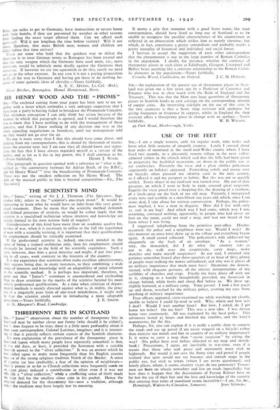THREEPENNY BITS IN SCOTLAND
SIR,—" Janus"' observation about the number of threepenny bits in Scotland may be neither clever nor funny (why should it be either?), but it does happen to be true; there is a little more profundity about it than your correspondent, Colonel Lorimer, imagines; and it is interest- ing in that it prettily reflects certain aspects of the Scottish character.
/41y own explanation of the prevalence of the threepenny piece in Scotland (upon which many people have repeatedly remarked) is that, in the old days, at least, it provided the Scotsman with a suitable Scottish answer to the " silver collection." It was an answer which he was called upon to make more frequently than his English cousins because of the strong religious tradition North of the Border. A sense of dignity (or less creditably, a fear of the opinion of neighbours- doully potent in so far as Church collections were frequently made on art open plate) induced a contribution in silver even if it was not offically a "silver collection," while a conflicting sense of thrift made the Scot feel for the smallest silver coin in his pocket. Hence the original demand for the threepenny bit—now a tradition, although Mali the tradition may have largely lost its meaning.
It seems a pity that someone with a good Scots name, like your correspondent, should have lived so long out of Scotland as to be unable to recognise the peculiar characteristics of his countrymen as reflected in an observation which strikes him as merely tiresome, but which, in fact, constitutes a pretty conundrum and probably masks a pretty interplay of historical and individual and social forces.
I hesitate to accept the suggestion of your other correspondent that the phenomenon is due to the large number of Roman Catholics in the population. I doubt, for instance, whether the currency of threepenny pieces in such cities as Edinburgh, Glasgow, Liverpool and Belfast bears anything like a constant relationship to the Roman Catho- lic elements in the population.—Yours faithfully,
Coombe Wood, Cuddesdon, nr. Oxford. J. C. H. DUNLOP.


























 Previous page
Previous page